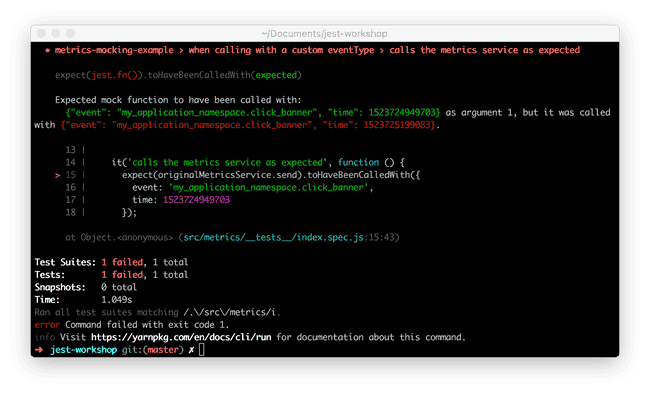Mocking Approaches
It is possible to use jest.spyOn for most of your mocking needs.
For instance, let's say we want to track how a user interacts with our website. If the user clicks on our banner, we will send a custom metrics event:
import sendMetric from "./send-metric";
const trackBannerClick = function () {
sendMetric({
eventType: "click.banner",
});
};
const Banner = () => (
<a href="..." onClick={trackBannerClick}>
<img src="..." />
</a>
);For the implementation we will take the given eventType, and interact with the metrics service with the current time, and a unique marker showing the origin of the event:
src/metrics/index.js
import * as metricsService from "./metrics-service";
export default function ({ eventType }) {
metricsService.send({
event: `my_application_namespace.${eventType}`,
time: Date.now(),
});
}Writing a test is very easy for this scenario. We can import the underlying
metrics API, directly use jest.spyOn, and mock the functionality as required,
and assert that we have interacted with the API as intended:
src/metrics/__tests__/index.spec.js
import sendMetric from "../index";
import * as originalMetricsService from "../metrics-service";
describe("metrics-mocking-example", function () {
describe("when calling with a custom eventType", function () {
beforeEach(function () {
jest.spyOn(originalMetricsService, "send").mockReturnValueOnce(true);
sendMetric({ eventType: "click.banner" });
});
it("calls the metrics service as expected", function () {
expect(originalMetricsService.send).toHaveBeenCalledWith({
event: "my_application_namespace.click_banner",
time: 1523724949703,
});
});
});
});The tests passed initially, but when we ran our tests again they failed:
It turns out that the hard-coded time stamp is the issue:
import sendMetric from "../index";
import * as originalMetricsService from "../metrics-service";
describe("metrics-mocking-example", function () {
describe("when calling with a custom eventType", function () {
beforeEach(function () {
jest.spyOn(originalMetricsService, "send").mockReturnValueOnce(true);
sendMetric({ eventType: "click.banner" });
});
it("calls the metrics service as expected", function () {
expect(originalMetricsService.send).toHaveBeenCalledWith({
event: "my_application_namespace.click_banner",
time: 1523724949703, });
});
});
});There's many ways to fix this functionality. Firstly, if we do not care about the particular of the time, other than requiring it being a number:
import sendMetric from "../index";
import * as originalMetricsService from "../metrics-service";
describe("metrics-mocking-example", function () {
describe("when calling with a custom eventType", function () {
beforeEach(function () {
jest.spyOn(originalMetricsService, "send").mockReturnValueOnce(true);
sendMetric({ eventType: "click.banner" });
});
it("calls the metrics service as expected", function () {
expect(originalMetricsService.send).toHaveBeenCalledWith({
event: "my_application_namespace.click_banner",
time: expect.any(Number), });
});
});
});If we care about the particular value, we can modify our test to include one of the following solutions:
// Use spyOn
jest.spyOn(Date, "now").mockReturnValueOnce(1234);
// Globally override time, remember jest is sandboxed
Date.now = function () {
return 1234;
};Advanced Jest Mocking
Jest additionally provides a very powerful module mocking system. However, the semantics of this can be unexpected in certain scenarios - as it uses babel to inspect and rewrite your code before it is ran.
Unlike jest.spyOn, you can use jest.mock(moduleName, factory, options) to rewrite entire modules:
jest.mock("../client", function () {
return {
get: jest.fn().mockReturnValueOnce(/* ... */),
post: jest.fn().mockReturnValueOnce(/* ... */),
delete: jest.fn().mockReturnValueOnce(/* ... */),
};
});When testing you may find yourself manually mocking all exposed methods of a given file. In this scenario it may be easier to rely on Jest's auto-mocking functionality which will mock all exposed functions by default if you do not supply a factory argument:
jest.mock("../foo", function () {
return {
fooMethod: jest.fn(),
barMethod: jest.fn(),
};
});
// Equivalent to the above
// Mock all exposed methods
jest.mock("../foo");With the automocking functionality, you can still spy on all functions within a module and modify particular behaviors too:
// Although this line appears first,
// the `jest.mock` will run first.
import someModule from "some-module";
// This will spyOn all of your module's
// functions by default. This is hoisted
// and runs first
jest.mock("some-module");
// Your test
beforeEach(function () {
someModule.foo.mockReturnValueOnce("...");
});Before making use of any of Jest's advanced mocking capabilities, consider whether ajest.spyOn would suffice instead.
